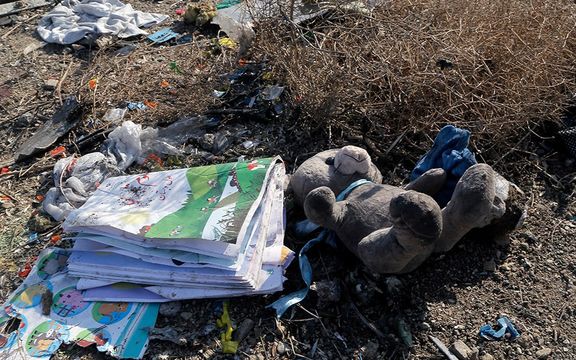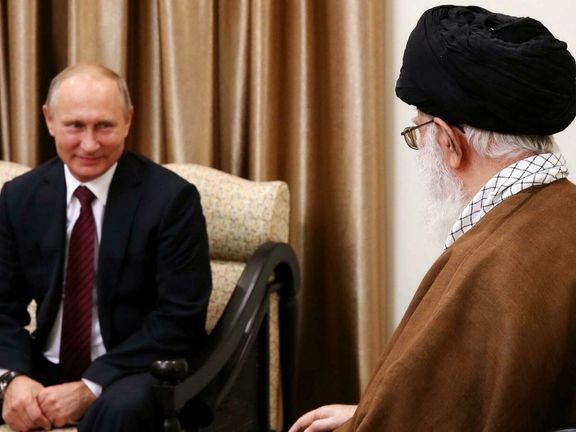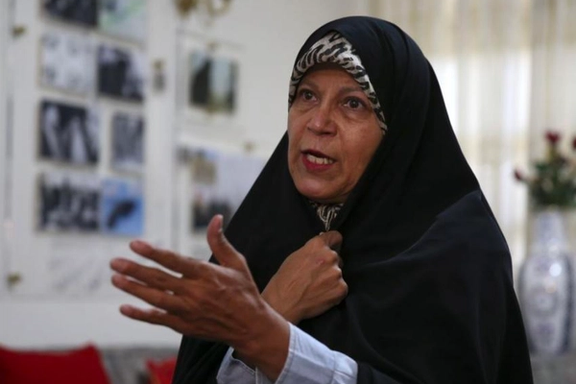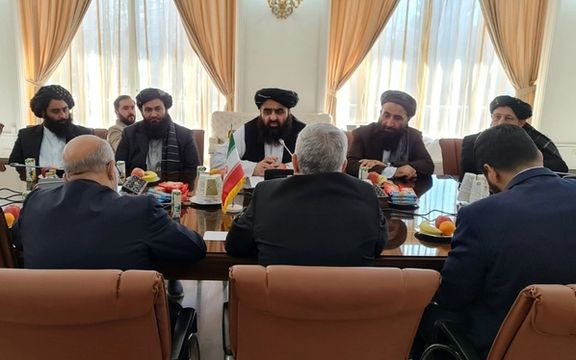Lawmaker Warns Against Manipulating Elections In Sports Federations

An Iranian lawmaker has sent a written warning to the sports minister, warning him against common manipulations in the elections of federation chairmen.

An Iranian lawmaker has sent a written warning to the sports minister, warning him against common manipulations in the elections of federation chairmen.
Abbas Moqtadaei, who is the deputy chair of the national security committee of the parliament, said on Tuesday that repeated delays in holding the election in the gymnastics federation have put it under the threat of suspension by international institutions.
He said that engineering the results of elections in sport federations has always been a problem in the country, and it is also reported under the current minister.
The elections in federations of boxing, shooting, basketball, taekwondo, skate, and some others have also caused controversy in recent months.
The mismanagement in Iran’s sport sector is not something new and has caused numerous problems for the sport community of the country, with many athletes leaving Iran to play for other countries.
Recently, the Asian Football Confederation (AFC) barred three top Iranian football clubs, including Persepolis and Esteghlal, from participating in the 2022 Asian Champions League tournament.
The AFC did not elaborate on the exact reasons behind the decision but said the clubs failed to meet the required licensing regulations that include issues such as timely submission of their documents or unpaid membership fees.

Iran’s hardline Kayhan daily has lashed out at news outlets for publishing an interview with the family of two victims who died in the downing of an airliner, saying they have a pro-US agenda.
During the interview, parents of two victims had said that the airliner was shot down deliberately to prevent possible US retaliation in the wake of Iran's missile attack on US bases in Iraq on January 8, 2020.
In an article titled "Revenge against the Revolutionary Guards on behalf of the United States”, Kayhan lodged an attack Tuesday against reformist outlets Ensaf News and Sharq newspaper, saying they want to create a poisonous atmosphere about the downing of the airliner.
The article said Mohsen Asadi-Lari, a former high-ranking health ministry official, and his wife Zahra Majd who lost both their children, misquoted remarks by Revolutionary Guard (IRGC) officials in their interview.
The bereaved parents, who broke their silence after two years, said IRGC officials had told themthat a war with the US could have happened if the plane was not shot down. "They say if the plane was not downed a difficult war would happen the next day. The US would have attacked, and ten million lives would be in danger."
Kayhan is known to be the mouthpiece for a lot of smear campaigns against the critics of the Islamic Republic and its Revolutionary Guards.

A large group of Lebanese politicians have established a new opposition group to end what they call Iranian occupation of Lebanon represented through Hezbollah.
During a press conference in Beirut on Monday, with about two hundred politicians and academics as well as key figures of civil society in attendance, “the National Council for the Ending Iranian Occupation" was officially launched.
The council was proposed by former MP Fares Souaid, and Ahmad Fatfat, another former minister and member of parliament, was appointed as the first chairman of its organizing committee.
According to its founders, the goal of the council is to break free from Hezbollah's armed hegemony over the country that has always been a threat to Lebanese sovereignty.
Hezbollah maintains an army of tens of thousands in the conflict-ridden and communally divided country, even though other groups that fought in the Lebanese civil war until 1990 have largely disbanded their militias. Hezbollah maintains total military sway in the south of the country, with bases and large hidden weapons stockpiles, including housands of missiles aimed at Issrael.
In his opening speech, Souaid expressed concern over the “existential crisis” of Lebanon that faces the threat of “collapse and paralysis”, stating that with true commitment to the constitution, Lebanon can dissociate itself from the regional turmoil, and its foreign ministry can adjust its priorities in relations with the international community.
Lebanon plunged into deep economic crisis in 2019 after years of borrowing and mismanagement related to corruption in its ruling elite. Many Lebanese hold Hezbollah responsible, because it had established itself as the dominant political power for more than a decade, practically with veto power in crucial political and economic issues.
Souaid stressed the need for a combination of national popular consensus and favorable international circumstances for Lebanon to overcome its existential crises, saying that ending the occupation is the “main entry point for resolving the crisis, internally through attachment to the Document of National Understanding and the constitution in spirit and words and in its entirety, and externally by rectifying our relations with our Arab environment and the international community”.
The Document of National Understanding was an agreement in 1989 that ended the 15-year Lebanese civil war.
He argued that the corruption which has bankrupted Lebanon and has put it on the brink of collapse is "a result of the successive Syrian and Iranian occupations of the country", emphasizing that “the Iranian occupation is an occupation in the truest sense of the word. It is not limited to a political or economic aspect but is exercised at all levels.”
It is not clear how effective the group can be in its quest to reduce Iran's influence. Disarming Hezbollah can only happen if there is an international and Arab move, which is currently outside the polititical realm.
Souaid had earlier said that “the National Council to End Iranian Occupation is a platform to call for the independence of the state from the grip of Iran so that it can solve the issues of its citizens and take measures that may benefit the Lebanese, away from of the weapons of Hezbollah and Iranian presence”.

Kayhan newspaper Monday attacked reformists for doubting Russia and China's role as Iran works with world powers in Vienna to revive the 2015 nuclear deal.
In a note published Monday, the flagship hardliner newspaper said reformists had long been “whitewashing” the 2015 agreement – the JCPOA (Joint Comprehensive Plan of Action) – while imputing dubious motives to both Moscow and Beijing.
Kayhan has close links with Supreme Leader Ali Khamenei’s office and its editor is appointed by Khamenei.
Kayhan, whose editor Hossein Shariatmadari opposed the JCPOA, signed by the reformist-backed government of President Hassan Rouhani, said reformists were alarmed that the agreement would be revived with better terms under President Ebrahim Raisi (Raeesi), who took office in August.
Among reformists expressing concern over Russia, Fayyaz Zahed, senior member of Etemad Melli Party, wrote Saturday in the party's Etemad newspaper that “a nuclear Iran” would be “a threat to Russia, more than it is to Europe and America.”
Zahed highlighted Moscow’s security relationship with Israel – presumably over Syria, where the two sides have coordinated their air presence, even though Moscow, like Tehran, backs President Bashar al-Assad.
Zejad also called for direct talks with the United States. While Iran has ruled out face-to-face discussions with the US since Washington left the JCPOA in 2018 and worked to keep the negotiations locked to JCPOA structures, extensive bilateral meetings preceded the deal being agreed in 2015.
"Meet and speak with Americans yourselves,” Zahed counseled. “The Leader has previously authorized that. Why should the most important decisions and negotiations of the country in decades be entrusted to precarious and unreliable middlemen?"
The author clearly referred to Russian and Chinese diplomats rather than those of France, Germany and the United Kingdom, the other JCPOA signatories in Vienna. Zahed suggested that Iran might somehow “become the price paid by Russia and China for resolving tensions” with the US over Ukraine and Taiwan.
Iran as kingmaker
A great sense of Iran not flexing its muscles was conveyed in a commentary in the reformist Shargh daily, where economist Gholamreza Nazarboland last Tuesday called Iran a "kingmaker" and "balancer" in the Middle East that could tip the scales of world power simply by who it chose to align with.
"It is probably for this reason that Russia has used the opportunity to place itself in the current talks in Vienna in the role of a connecting link in the absence of the US which is not directly present," Zahed wrote.
Alleging that Russian envoy and avid tweeter, Mikhail Ulyanov "shrewdly" pushed Russian policy, deciding “which facts to report and which to hide,” Zahed suggested Moscow sought to make Iran dependent on Russia, and to control its relations with the “western world,” particularly the US.
Some conservatives are also wary of Russia and China influencing negotiations. The conservative Jomhouri Eslami has repeatedly accusedUlyanov of "meddling." In an editorial Tuesday headlined "Ulyanov Is Not Iran's Envoy", it criticized Iran’s foreign ministry for not taking action.
Jomhouri Eslami was outraged that in many meetings with delegations from Saudi Arabia, the US, and European countries, Ulyanov had "engineered" the outcome of the Vienna talks to suit his own government's interests.
"Protesting to Ulyanov's behavior is a patriotic act, demand for independence, and aimed at preventing foreign interference,” the editorial declared.

Iran’s domestic and foreign policies are "irrational, Taliban-style, and propaganda based,” outspoken former lawmaker and presidential daughter, Faezeh Hashemi has said.
Referring to the sizable number of security and military officials working for President Ebrahim Raisi as top managers, she said, "Raisi is just a front man. There are others who puppeteer him from behind the scenes and influence his decision-making." She said, "I hope I am mistaken, but if this is true, Raisi is going to be blamed for his aides' mistakes."
Faezeh hashem is the daughter of Iran's former president Akbar Hashemi Rafsanjani, who was a close collaborator with Supreme Leader Ali Khamenei but later fell out of favor whne he supported protesters in 2009.
Meanwhile, Hashemi said Iran has been involved in killing some 500,000 people in Syria. Pointing out Iran's involvement in killing Muslims in Yemen and elsewhere, she said it is highly unlikely that Israel has killed 100 to 200 thousands Palestinians. "We have killed more Muslims than Israel with our wrong policies," she said.
In an interview with the news website Didehban-e Iran [Iran Monitor], published on Monday [January 10], she said IRGC officers who have joined the Raisi administration as his provincial governors-general cannot help him solve the country's problems. She also charged that Basij militia and IRGC officers are placed in cabinet ministers' offices to control them. She warned Raisi that in this way, he is going to have more problems in the future.
Hashemi, who spent time in jail as a political prisoner, shocked many in April 2021 when she praised Donald Trump and Iran’s last monarch, Mohammad Reza Shah.
Hashemi criticized the government's economic policies and said that Vice President Mohammad Mokhber, who has been working in an organization confiscating people's properties throughout his career, cannot understand the importance of privatization and economic reforms as the leader of Raisi's economic team. "There is no bright prospect for Iran's economy," she said.
She further criticized the appointment of inexperienced officials to key posts and said, "Corruption is not limited to financial corruption and astronomical salaries. Appointing incapable individuals to key posts will lead to corruption."
Hashemi’s criticisms of Raisi’s appointments are shred by many observers and politicians, some even from the country’s conservative camp.
Speaking about some government officials who usually suggest that people should tolerate hardships, Hashemi said: "OK. We will tolerate, but first we need to know where we are going. Are we tolerating the hardships to reach freedom? Good economy? Justice? Development? Or what? Unfortunately, there is no prospect ahead of us."
Criticizing Khamenei's policy for increasing Iran’s population, she said, he should have first assessed why there is a decline in population growth. Perhaps people do not want more children because of economic hardships. She added, there is nothing wrong with men and women living together without getting married, but she said she detested the idea of some men getting married to more than one woman.
To hardliner lawmakers who wish to impose an ideological lifestyle on Iranians, she said: "They are reckless. Iran is not North Korea." Speaking about other ideas such as only female doctors being allowed to treat female patients at hospitals, Hashemi said "these are Taliban-style policies."
In another part of the interview, Hashemi said the presidential election that brought Raisi to power was odd. "Everything was pre-planned for his election and anything that could possibly prevent his election was taken out of the way."
Speaking on the impact of sanctions on the Iranian economy, she said: "Sanctioned have caused essential problems, but the impact of mismanagement is bigger. If it were not for mismanagement, we would have not been sanctioned in the first place."

The Taliban has confirmed that acting foreign minister Amir Khan Muttaqi met with opposition figure Ahmad Massoud during his visit to Iran.
Muttaqi saw both the leader of the National Resistance Front and Herat governor Mohammad Ismail Khan while in Tehran, Zabiullah Mujahid, the Taliban’s main spokesman and acting deputy information minister, tweeted on Monday.
Mujahid wrote that Muttaqi had assured them that they could “return home without any worries.” Massoud has been widely touted as a leader who might rally military resistance to Afghanistan’s new rulers.
The meeting with Massoud was also confirmed by Bilal Karimi, the Taliban deputy spokesman, who said both men had been urged to go home to live peacefully.
Muttaqi also met with Iranian Foreign Minister Hossein Amir-Abdollahian and Hassan Kazemi Qami, the Iranian president's special Afghan envoy. On Monday, Iran’s foreign ministry spokesman Saeed Khatibzadeh said Iran had “hosted various Afghan groups on various occasions.”
Afghanistan International had quoted unnamed sources saying that Mutaqqi had arrived in Tehran on the invitation of the Islamic Revolution Guard Corps (IRGC) and would meet opposition figures, including Massoud snd Ismail Khan, who tried to rally anti-Taliban forces in July in Herat.
A photo taken in Kabul airport before his departure showed a Mahan airline plane waiting on the tarmac. Mahan is an IRGC-affiliated company.